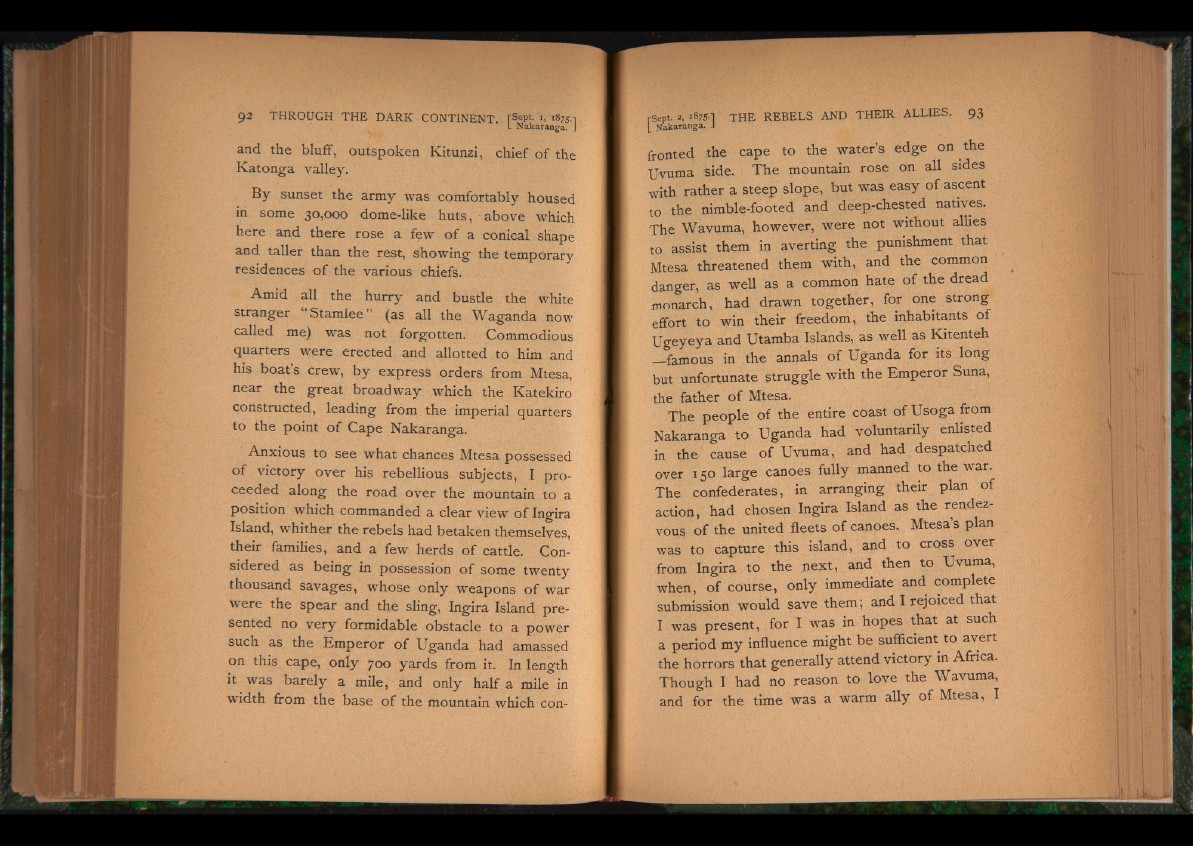
and the bluff, outspoken Kitunzi, chief o f the
Katonga valley.
B y sunset the army was comfortably housed
in some 30,000 dome-like huts, above which
here and there rose a f«?w o f a conical shape
and taller than the rest, showing the temporary
residences o f the various chiefs.
Amid all the hurry and bustle the white
stranger “ Standee” (as all the Waganda now
called me) was not forgotten. Commodious
quarters were erected and allotted to him and
his boat’s crew, b y express orders from Mtesa,
near the great broad w a y which the Katekiro
constructed, leading from the imperial quarters
to the point o f Cape Nakaranga.
Anxious to see what chances Mtesa possessed
o f victory over his rebellious subjects, I proceeded
along the road over the mountain to a
position which commanded a clear view o f Ingira
Island, whither the rebels had betaken themselves,
their families, and a few herds o f cattle. Considered
as being in possession o f some twenty
thousand savages, whose only weapons o f war
were the spear and the sling, Ingira Island presented
no v e ry formidable obstacle to a power
such as the Emperor o f Uganda had amassed
on this cape, only 700 yards from it. In length
it was barely a mile, and only half a mile in
width from the base o f the mountain which confronted
the cape to the water’s edge on the
Uvuma side. The mountain rose on all sides
with rather a steep slope, but was easy o f ascent
to the nimble-footed and deep-chested natives.
The Wavuma, however, were not without allies
to assist them in averting the punishment that
Mtesa threatened them with, and the common
danger, as well as a common hate o f the dread
monarch v had drawn together, for one strong
effort to win their freedom, the inhabitants o f
Ugeyeya and Utamba Islands, as well as Kitenteh
famous in the annals o f Uganda for its long
but unfortunate struggle with the Emperor Suna,
the father o f Mtesa.
The people of the entire coast o f Usoga from
Nakaranga to Uganda had voluntarily enlisted
in the cause o f Uvuma, and had despatched
over 150 large canoes fully manned to the war.
The confederates, in arranging their plan o f
action, had chosen Ingira Island as the rendezvous
o f the united fleets o f canoes, Mtesa’s plan
was to capture this island, and to cross over
from Ingira to the next, and then to Uvuma,
when, o f course, only immediate and complete
submission would save them; a n d I rejoiced that
I was present, for I was in hopes that at such
a period my influence might be sufficient to avert
the horrors that generally attend victory in Africa.
Though I had no reason to love the Wavuma,
and for the time was a warm ally o f Mtesa, I